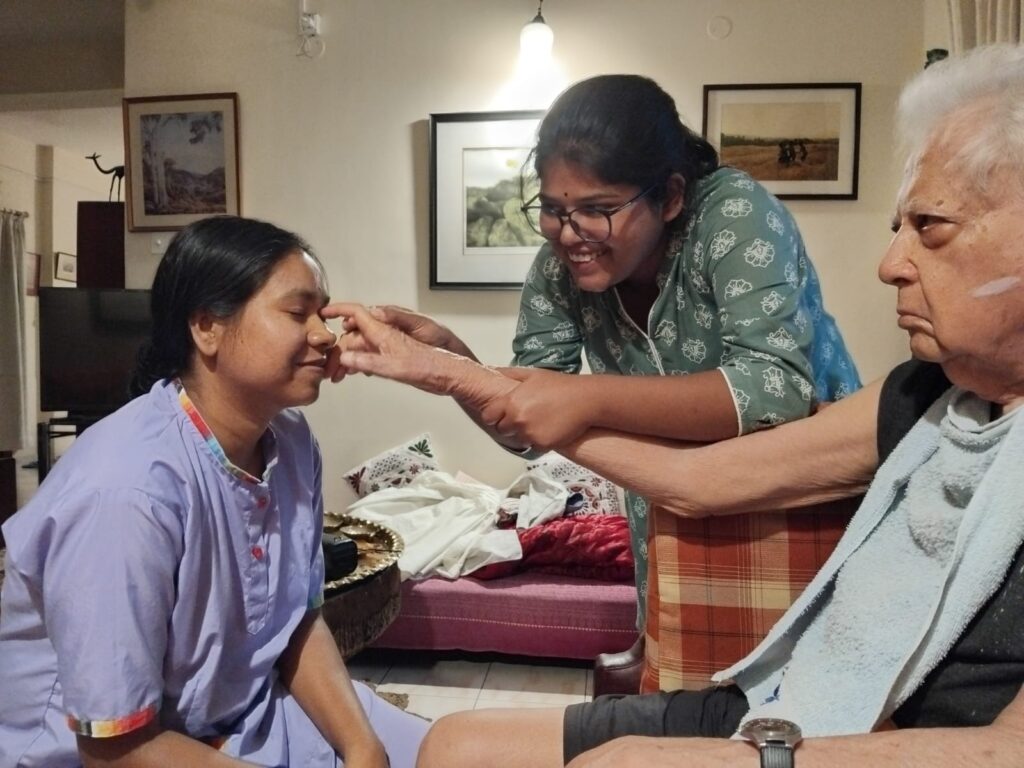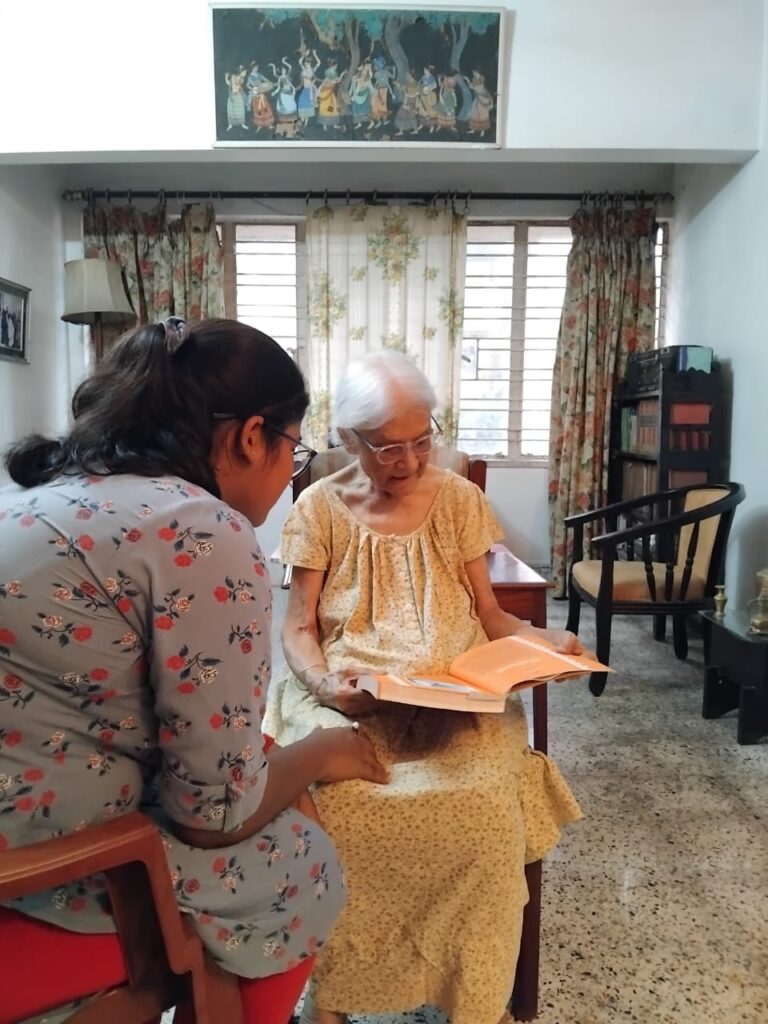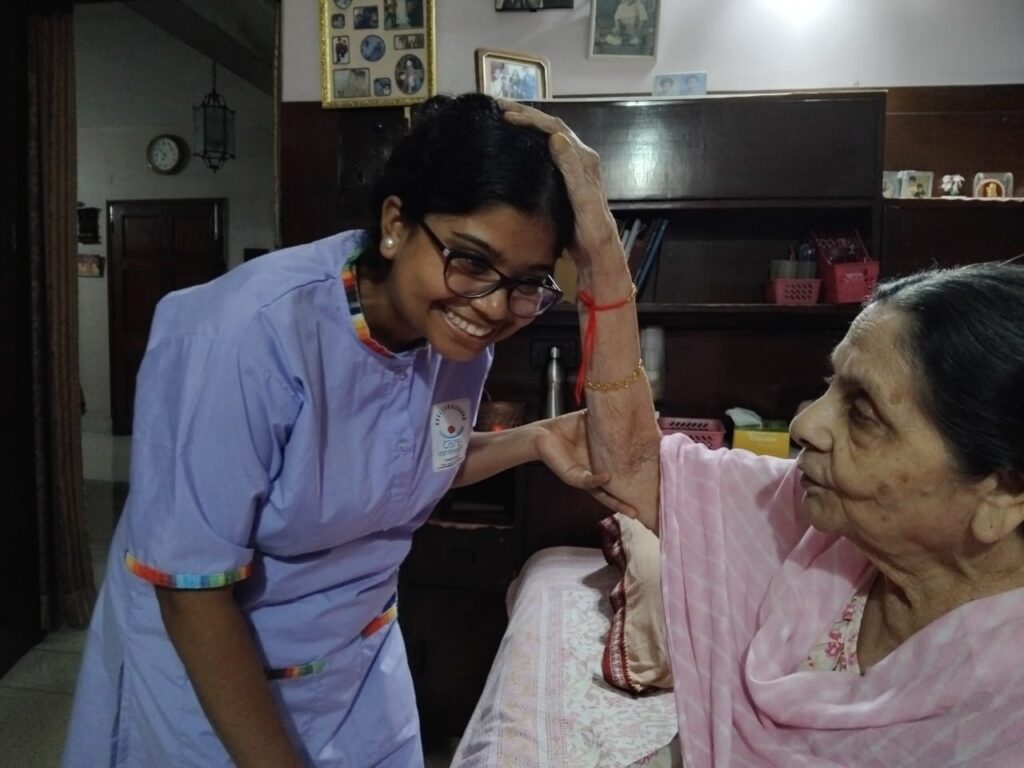Care at home in Kolkata, Indore for a patient after hospital discharge requires meticulous planning and attention to detail. Ensuring the patient’s smooth transition from hospital to home is critical for their recovery. This write-up provides comprehensive guidelines to assist caregivers. For managing the various aspects of post-discharge care, from preparing the home environment to planning for emergencies.

Preparing the Patient’s room For better Care at Home in Kolkata, Indore after Discharge from the Hospital
- Position and Type of Bed: Care at home should start with the patient’s bed located in a well-ventilated, quiet room with ample natural light. The bed should be easily accessible from all sides (hence a single bed is recommended). In particular, from the right side, allowing for comfortable movement and assistance. For patients with mobility or feeding issues, an adjustable hospital bed. (Fowler’s or Semi-Fowler’s) may be necessary to provide the right care. These beds can be adjusted to various positions to improve comfort & ease of access. If a hospital bed isn’t feasible, a firm, flat mattress with good support should be used. Additionally, the patient may require an air mattress (to prevent bedsores) or a backrest (for feeding).
- Bed Linen: The bedding should be made of soft, breathable fabric, such as cotton, to prevent skin irritation. Depending on the patient’s condition, waterproof or absorbent bed pads may be necessary to protect the mattress from any accidents. Pillows should be supportive yet comfortable, with additional cushions or wedges available. This helps the patient maintain a comfortable position. Particularly if they need to be propped up to facilitate breathing or to prevent pressure ulcers.
- Additional Aspects for Providing Better Care at Home in Kolkata, Indore:
- Electrical sockets close to the bed but away from the line of movement (preferred over the bedhead like they are positioned in a hospital) are often needed since the patient may need to use a nebuliser, or CPAP or other equipment which are powered by electricity.
- An electric hot pad/hot water bag and an Ice pack are essential to keep handy. This is for various types of situations such as swellings, aches and pains, hesitancy in urination etc.
Maintaining the convalescing person’s Grooming, Toileting and Hygiene
Grooming Care At Home in Kolkata, Indore
Maintaining personal hygiene is crucial for a patient’s well-being and self-esteem. Regular grooming helps prevent infections, promotes circulation, and enhances the patient’s comfort. Depending on the patient’s mobility, s/he may need assistance with bathing, hair care, and oral hygiene. It’s essential to establish a daily routine that includes these tasks. As consistency can help the patient feel more in control and comfortable. Ensure that all necessary grooming supplies, such as mild soaps, soft towels, and nail clippers, are easily accessible. Encourage the patient to perform their own tasks as far as feasible. This will help to keep their muscle memory active.
Proper Toileting Procedure
For patients who have difficulty moving, it’s important to set up a convenient and safe toileting system. This could include a bedside commode, bedpan, or urinal. Ensure that the toilet area is clean, well-lit, and free of obstacles to prevent falls. Non-slip mats and grab bars can provide additional safety. For patients who are bedridden, regular repositioning and the use of incontinence products may be necessary to prevent skin breakdown. It’s also important to monitor the patient’s toileting patterns and report any changes. Such as signs of infection or constipation, to their healthcare provider.
| Important Tip | Process |
|---|---|
| To Prevent Abrasion | Always wipe the patient’s body with soft cotton or hosiery cloth or baby wipes that are fragrance-free. |
| Treating Sores | Do not use plain cotton wads or balls. Treat any sores very carefully. |
| Call for Action | If the situation worsens, inform your home healthcare provider as soon as possible. |
Controlling Infections for Better care at home in Kolkata, Indore
- Regular housekeeping of the patient’s room is essential. Keeping the work area (where medicines are prepared for administration) and the papers in order helps with correct therapy and prevents secondary infections.
- It’s important to change the bed linen regularly to maintain hygiene and comfort. Stains should be removed with cold water and linen washed twice (2nd time in hot water) is better for disinfection, if feasible.
- A medium to large covered waste bin helps with waste disposal. Using a yellow polythene bag (separate from general waste which is generally black) to line the waste bin helps to differentiate the patient’s waste from general waste.
- Any sharp wastes such as needles and broken ampoules should be discarded in a hard plastic container with a lid that is half-filled with any solution such as Dettol (Directions for mixing are generally available on the disinfectant bottle’s label). Once this container is about 2/3rds full, it should be discarded after properly screwing the lid shut and a fresh container should be used in a similar manner.
- An attached toilet and bath are very helpful even if the patient may not be able to get out of bed. The caregiver needs to wash their hands frequently for which an attached basin helps. Also, it’s easier to disinfect soiled linen in the WC & soak it in soap water for subsequent washing.
- The patient’s food needs to be prepared and served in clean utensils. Food for the patient needs to be preferably prepared daily and a balanced diet with sufficient dietary nutrients, vitamins and anti-oxidants goes a long way in supporting the patient’s recovery& preventing infections.

Following the prescribed Diet Plan Provided for Care at Home in Kolkata, Indore
Right Nutrients and Calories
Following a balanced diet plan is vital for the patient’s recovery. The diet should be rich in nutrients and calories appropriate to their specific needs. A nutritionist or the patient’s healthcare provider can create a meal plan that accommodates any dietary restrictions or needs related to their condition. For instance, patients recovering from surgery may need extra protein to support healing, while those with heart conditions may need to limit sodium intake.
Meal preparation should prioritize fresh, whole foods over processed ones. Small, frequent meals may be easier for some patients to manage, especially if they have a reduced appetite. For patients with difficulty swallowing, soft or pureed foods may be necessary. Additionally, ensure that the patient is adequately hydrated. Offering water or other fluids regularly, if not restricted by the treating physician.
It may be helpful to keep a food diary to monitor the patient’s intake and ensure they are receiving the appropriate nutrients. If the patient has specific dietary requirements, such as a need for a diabetic or low-cholesterol diet, ensure that these are strictly followed.
Organizing Medicines, Equipment & Consumables such as Oxygen
Medication Administration for Care at Home in Kolkata, Indore
Organizing and administering medication is one of the most critical tasks in post-discharge care. A detailed medication schedule/chart that includes the names of the medicines, dosages, times to be taken, and any special instructions (e.g., take with food, avoid certain activities) is helpful to check for compliance. Using a pill organizer or a medication management system can help prevent missed doses or errors. It’s also advisable to set up reminders, either through a smartphone app or an alarm, to ensure that medications are taken on time.
Replenishing Stock
Keeping an eye on medication supplies helps to avoid running out of essential drugs. Tracking the stock levels regularly and reordering prescriptions in advance is important. It may be helpful to set up an automatic refill service with the pharmacy, where medications are delivered to your home before they run out. In case of any changes in the prescription, the medication schedule needs to be immediately updated and all relevant caregivers informed.
Oxygen Supply & Equipment Maintenance
If oxygen therapy is prescribed, ensure that an adequate supply of oxygen is always available. Keep backup oxygen cylinders or concentrators on hand in case of emergencies. Any home medical equipment needs regular checking for proper functioning and replacement/repair as needed. It’s also important to be familiar with the correct usage of the equipment to prevent accidents or malfunctions.
Arranging for an On-Call Nurse for Better Care at Home in Kolkata, Indore
Having access to a nurse on call can provide peace of mind and immediate assistance in case of any concerns or complications. Arrange for a home healthcare service that can provide skilled nursing care if required, such as Care Continuum. This service can also help with more complex medical tasks, such as wound care, intravenous therapy, or monitoring vital signs. Ensure that you have the contact details of the healthcare provider easily accessible, along with a list of symptoms or situations that would require their immediate attention.
Planning for Hospital Transfer In Case of Emergency (ICE)
Despite the best care, there may be situations where the patient’s condition deteriorates, requiring urgent medical attention. It’s essential to have an emergency plan in place for quick hospital transfer.
Preparation: Keep the patient’s medical records, including the discharge summary, recent test results, and a list of current medications, in an easily accessible location. This will be invaluable for emergency responders and the hospital staff. Ensure that you have the contact information for the patient’s primary physician and the nearest hospital’s emergency department.
Transportation: Plan the quickest route to the hospital and identify the mode of transportation, whether it’s a private vehicle or an ambulance. If you anticipate frequent emergencies, it may be worthwhile to arrange for an ambulance service that can be called at a moment’s notice. Familiarize yourself with the signs that indicate a need for emergency care, such as severe pain, difficulty breathing, or sudden changes in consciousness.
Encouraging Self-Care and Activities of Daily Living (ADL)
Self-Care: Encouraging the patient to participate in their own care can significantly boost their confidence and sense of independence. Start with small tasks that they can manage on their own, such as brushing their teeth, feeding themselves, or choosing their clothes. Gradually increase their involvement in daily activities as their strength and mobility improve. It’s important to be patient and provide positive reinforcement to build their self-esteem.
Activities of Daily Living (ADL): ADLs are the basic tasks of everyday life, including eating, bathing, dressing, and moving around. Depending on the patient’s abilities, assist them in performing these tasks, while promoting as much independence as possible. Physiotherapy &Occupational therapy may be beneficial in improving Gait, Balance, Pain etc. and in teaching the patient strategies to manage ADLs more effectively. Adaptations to the home, such as installing grab bars or using assistive devices, can also support the patient’s ability to perform ADLs safely.
Age-related Issues: Often, elderly patients are found to be lacking in motivation to recuperate blaming weakness, forgetfulness and ageing for their inabilities. It is important to measure cognitive impairment in such people to screen for Depression or Dementia. In such cases, early Psychological interventions such as Movement Psychotherapy, Counseling etc. can slow such decline to a great extent.
In Conclusion
The transition from hospital to care at home is a critical period that requires careful planning and execution. By focusing on these key areas—preparing the home, planning for grooming and toileting, ensuring proper nutrition, organizing medications, preparing for emergencies, and encouraging self-care. You can provide a supportive environment that fosters recovery and enhances the patient’s quality of life.

